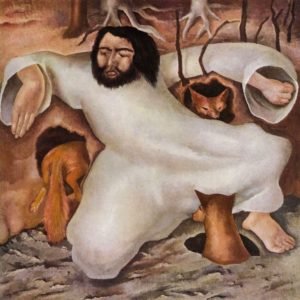Christ in the Wilderness: Foxes Have Holes, Stanley Spencer 1891-1959
Mount Calvary Church
A Roman Catholic Parish
The Personal Ordinariate of the Chair of S. Peter
Eutaw St. and Madison Ave.
Baltimore, Maryland
Rev. Albert Scharbach, Pastor
Dr. Allen Buskirk, Choirmaster
Trinity II
June 30, 2019
Summer Schedule
One Mass at 9:00 A.M.
Breakfast following in the undercroft
Common
Merbecke
Instrumental Music
Offertory: Bartolomeo Campagnoli Caprice No.2 for Solo Viola.
Communion: Prelude from J. S. Bach’s 4th Cello Suite
Hymns
He who would valiant be (ST. DUNSTANS) is a reworking by Percy Dearmer (1867—1936) of a poem “He who would true valour see” by John Bunyan in the Pilgrim’s Progress.
Humbly I adore Thee is a translation and adaptation of part of the Adoro te devote, which was composed by Thomas Aquinas (1225—1274) as a private prayer of devotion. Aquinas addresses Jesus in the sacrament as Truth, “Verity unseen.” For Aquinas, truth was the conforming of the mind to reality. The reality of the Eucharist is that Jesus is present beneath the outward signs of bread and wine. We believe this because Jesus has said it: “This is my Body.” The sacrament is a memorial in the fullest sense of the word: through the Mass the One Sacrifice of Calvary becomes truly present to us. We now see Jesus veiled, but our deepest desire is to see Him face to face. In that vision of God-become-Man for love of us, we are fully conformed to that truth and blessed because we attain the purpose for which we were created.
A mighty fortress is our God is from the German translation of Psalm 46 by Martin Luther. Leading Catholic liturgical scholar and musician Edward Foley calls Martin Luther “a model pastoral musician… a proponent and composer of music from the people and for the people, as evidenced in his chorales.” Speaking specifically of Ein feste Burg—the German title for “A mighty fortress”, Fr. Foley notes that this chorale “appears to be a paradigm of liturgical ‘people music.’” Luther’s “craft is affirmed by its ageless singability” — high praise from a Catholic scholar, indicating not only the quality of Luther’s work, but also its ecumenical popularity.
